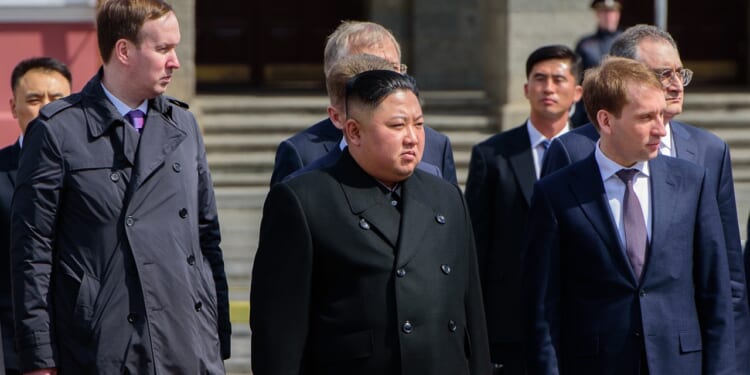Experts warn that Russian technology will accelerate North Korea’s ability to deploy longer-range, stealthier submarines capable of carrying nuclear missiles.
Russia and North Korea have deepened their military cooperation since signing a comprehensive strategic partnership treaty in June 2024. The agreement included commitments to mutual defense and technology sharing in exchange for North Korean support in Russia’s ongoing war in Ukraine, such as providing missiles, ammunition, and troops.
Recent reports further detail how the Russo-North Korean alliance was extended to Russia’s assistance in advancing North Korea’s submarine program, particularly through the transfer of nuclear propulsion technology.
An End to the Status Quo Across Eurasia
South Korean intelligence suggests Russia supplied North Korea with two to three submarine reactor modules in the first half of 2025, including components like reactor cores, turbines, and cooling systems sourced from decommissioned Russian nuclear-powered submarines. This transfer came amid repeated requests from Pyongyang since last year for advanced submarine technology, with Russia initially hesitant but ultimately agreeing as part of the quid pro quo. Beyond reactors, Moscow is believed to be helping Pyongyang with submarine-launched ballistic missile (SLBM) systems and other naval technologies, potentially enabling the development of nuclear-armed submarines. Earlier analyses from last year noted Russian influence in North Korea’s submarine designs, such as modifications to diesel-engine models, and possible aid in building more advanced warships.
In return, North Korea has provided Russia with copious amounts of missiles and artillery shells—and reportedly up to 10,000 troops—for the Ukraine War. This deal also includes Russia aiding North Korea in evading international sanctions and enhancing its overall nuclear capabilities, such as low-yield tactical nuclear weapons.
The assistance aligns with North Korea’s long-term goal of building a credible nuclear-powered submarine fleet to counter American and South Korean naval superiority in the region. North Korean dictator Kim Jong-un has prioritized naval modernization, including the launch of a tactical nuclear-armed submarine in 2023 based on modified Russian designs. For Russia, the partnership provides critical wartime resources while expanding its influence in Asia amid isolation from Western countries.
Contextualizing the Russia-North Korea Alliance
While a relationship between Moscow and Pyongyang has existed since the early days of the Cold War, that relationship, especially following the Korean War and the death of Joseph Stalin, was increasingly less of a priority for Moscow over the years. Indeed, after the fall of the Soviet Union, Beijing supplanted Moscow as Pyongyang’s primary benefactor throughout the 1990s and 2000s.
But North Korea is notoriously prickly to its erstwhile benefactors. Once Kim Jong-un assumed power in North Korea, even China had a bit of a falling out with the North Korean regime. After the mysterious assassination of Kim Jong-nam, Kim’s half-brother, at a Thailand airport in 2017, rumors persisted that Kim had ordered the assassination because he feared that Beijing was angling to oust him and replace him with a more pliant member of the Kim dynasty.
The discord between Beijing and Pyongyang created a diplomatic window of opportunity in President Donald Trump’s first term, and US-North Korea negotiations started to make some progress in improving ties. Ultimately, though, Trump’s attempt at diplomacy ended in failure—at least in part because he lost his 2020 reelection bid to President Joe Biden, who chose not to continue the negotiations as Trump had wanted.
Now, because of the Ukraine War, Russia has risen to primacy in terms of being North Korea’s best partner. Moscow, which needs North Korea’s continued support for its war in Ukraine, will do whatever it must to ensure Pyongyang’s commitment to their cause. In turn, Pyongyang’s worst excesses will be indulged by the desperate and single-minded Russians.
What does this mean, in real terms? Experts warn that Russian technology will accelerate North Korea’s ability to deploy longer-range, stealthier submarines capable of carrying nuclear missiles, potentially placing more global targets within reach and complicating regional deterrence. This may violate the Nuclear Non-Proliferation Treaty (NPT), triggering fresh sanctions. But essentially every sanction that can be applied to either capital has already been applied, and neither is likely to care.
There Is No Containing Russia or North Korea Anymore
The sanctions have failed in their goal to halt Russia’s war machine, so the empty threat of further sanctions will hardly dissuade the Russians. The North Koreans are probably the most sanctioned people on Earth, so it is doubtful that Kim will care much if more sanctions are added to the ledger.
The Russo-North Korean ties have proven to be a significant geopolitical event brought about explicitly because of the ongoing Ukraine War. It is unlikely that the kind of a lá carte partnership that today exists between Moscow and Pyongyang would have ever been possible without the Ukraine War having taken place—and continued on far longer than it should have been allowed to continue.
This newfound alliance impacts the frontline of the Ukraine War, but it also has the potential to upend the balance of power on the Korean Peninsula. It could lead to North Korean military supremacy there—particularly as the new South Korean government continues to distance itself from Washington.
About the Author: Brandon J. Weichert
Brandon J. Weichert is a senior national security editor at The National Interest. Recently, Weichert became the host of The National Security Hour on America Outloud News and iHeartRadio, where he discusses national security policy every Wednesday at 8pm Eastern. He is also a contributor at Popular Mechanics and has consulted regularly with various government institutions and private organizations on geopolitical issues. Weichert’s writings have appeared in multiple publications, including The Washington Times, National Review, The American Spectator, MSN, The Asia Times, and others. His books include Winning Space: How America Remains a Superpower, Biohacked: China’s Race to Control Life, and The Shadow War: Iran’s Quest for Supremacy. His newest book, A Disaster of Our Own Making: How the West Lost Ukraine is available for purchase wherever books are sold. He can be followed via Twitter @WeTheBrandon.
Image: Shutterstock / Goga Shutter.


















